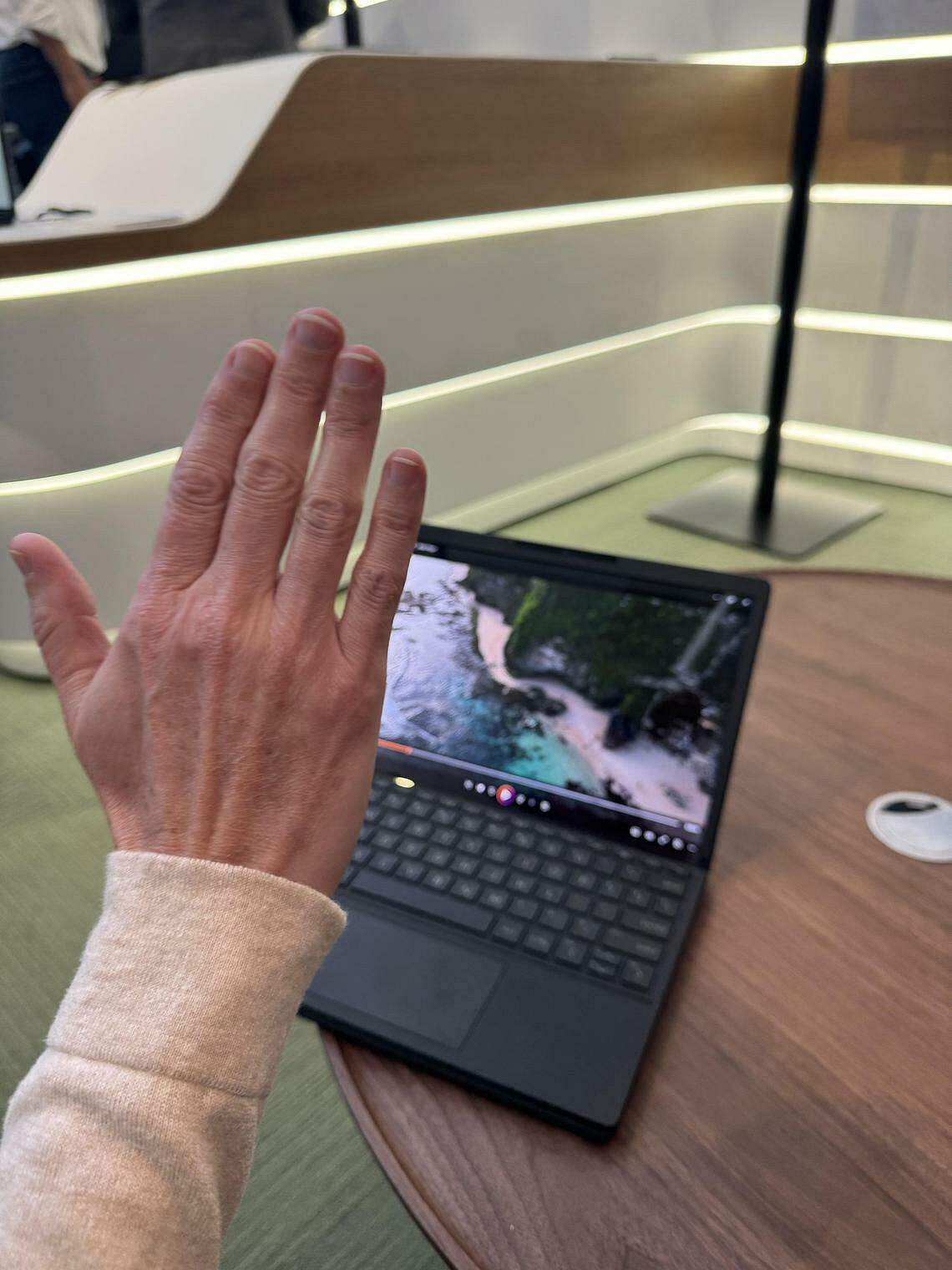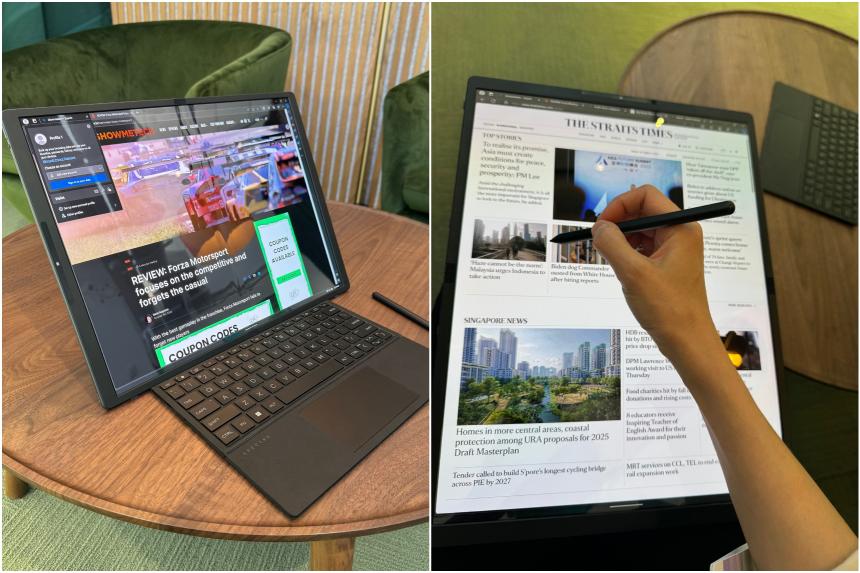PALO ALTO - HP’s 12-inch laptop that can open up into a 17-inch tablet is one of several new products kitted out with the latest tech that could loosen buyers’ purse strings and breathe life back to a PC sector that has not seen growth since the pandemic years.
The new HP Spectre Fold, with an accompanying wireless keyboard and a wireless pencil, will be available worldwide, including in Singapore, from November for US$4,999 (S$6,830).
Its newfangled artificial intelligence (AI) capabilities allow users to manipulate images and videos with hand gestures instead of touching the screen, among other things.
The gadget, first launched in the United States and Britain in September, can also be propped up on its long edge by popping out a built-in kickstand.
The 17-inch screen offers more desktop space to serious multitaskers, as well as versatility to road warriors for viewing architectural drawings or dense spreadsheets.
When folded with a magnetic Bluetooth keyboard snapped onto the bottom half of the folded screen, the HP Spectre Fold becomes a 12-inch clamshell that looks like a regular laptop.
“We are going to go from the personal computer to the personal companion,” said HP chief executive Enrique Lores on Thursday from the company’s Palo Alto headquarters.
AI underpins the transformation of the PC to take on this new role as a personal companion, he added.
The tech can smarten up the PC’s built-in camera and microphone to recognise hand gestures and voice commands to make it more accessible, including to people with disabilities.
For a start, the HP Spectre Fold recognises basic hand gestures pointing left and right for scrolling through an image gallery.
Holding up one’s hand in front of the camera starts or stops the playing of a video.
“What we love about AI is that it’s really going to enable multi-modal interactions, which means we will be able to interact (with the PC) without the traditional keyboard or mouse,” said HP’s president of personal systems Alex Cho.
“I call this a 1999 moment. Remember when the Internet drove dramatic new experiences for people around the world and changed what we need for PCs? It’s going to happen again with AI,” he said.
“We’re already working (on it) through large language models on devices so that you can use verbal and facial gestures.”
Large language models or AI chatbots such as OpenAI’s ChatGPT, Microsoft’s Bing and Google’s Bard have advanced natural language processing abilities that allow the chatbots to converse with humans in a conversational way not previously possible.
They also enable live language translation.
“So think of two different people who are able to connect and have the ability to communicate in real time even if they speak different languages. That’s really the power of what all these models are enabling,” said Mr Cho.
These AI uses are expected to come on stream as early as November, when Microsoft rolls out its Windows 11 update with new AI features to let users prompt the Bing chatbot to generate text, summarise e-mails and meeting transcripts, and create PowerPoint presentations.
Similarly, Google has introduced a new feature to allow users to instruct Bard to scan and summarise e-mails and documents, or pull real-time flight information and YouTube videos on a certain topic.
Mr Lores said these new uses are expected to generate demand for new computers engineered differently for better data security, faster language processing and translations and reduced power consumption.
On Thursday, HP also launched a US$899 battery-powered desktop computer – the Envy Move 23.8-inch All-in-One PC.
The portable desktop uses AI to detect when to switch between spatial and stereo audio playback based on how far the user is from it.

Personal systems, which comprise laptops and desktops, account for two-thirds of HP’s total revenue.
During the company’s third fiscal quarter that ended July 31, 2023, personal systems contributed net revenue of US$8.9 billion, down 11 per cent year on year, on total revenues of US$13.2 billion, which was also down 9.9 per cent year on year.
The current slump contrasts sharply with purchases seen during the Covid-19 pandemic.
In 2020, PC shipments rose 13 per cent over the previous year to reach 302 million units, which market research firm IDC said was the highest growth seen in 10 years.
Driven by work-from-home trends, PC demand continued into 2021 – about 348 million units – despite component shortages.
But demand started to wane again in 2022, with 292 million units of PCs shipped globally, as users held back on purchases due to inflation and in anticipation of a worsening global economy.
Smartphones, consoles and tablets also compete for tech spending, with IDC projecting that PC shipments will fall to 252 million units in 2023.
IDC, however, expects demand for new PCs to gain a slight rebound to 261.4 million units in 2024, as companies replace their old PCs due to the end of Microsoft’s support for Windows 10 in 2025.
Currently, Lenovo and Asus also sell laptops with foldable screens.
The Lenovo Yoga Book 9i hit Singapore shelves in June 2023, priced at $3,699, while the Asus Zenbook 17 Fold started retailing here in October 2022 for $5,499.
Mr Maciek Gornicki, senior research manager for client devices at IDC Asia-Pacific, said that these foldable laptops appeal to a niche group of users, such as video and graphics creators and frequent travellers who like to multitask.
“Gesture controls may be a nice addition and make it easier to perform simple tasks, but I don’t think it will redefine the way we use a computer in the near future,” he said.
However, Mr Mukund Tripathi, head of market intelligence at market research firm GfK in Asia Pacific, is more optimistic.
“ The development of laptops with gesture controls marks a significant advancement in human-machine interaction,” he said. “It can enhance productivity, creativity and entertainment experiences, opening up exciting new frontiers for these devices.”


